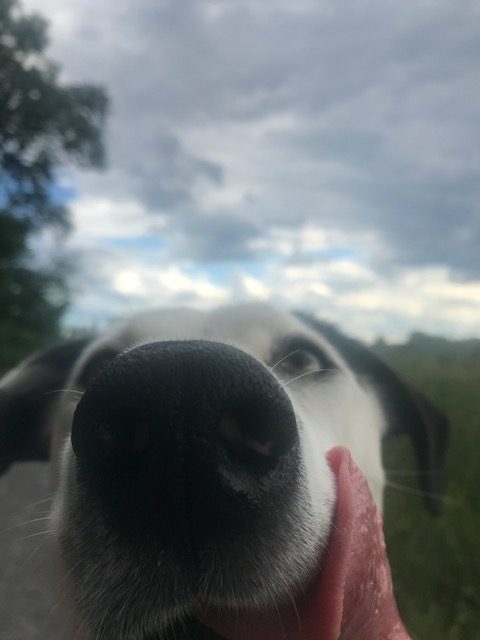–

–
Maggie, my daughter, has an eye for photos. Especially when it comes to our sweet Echo.
This remarkable perspective, his glorious snout, brought to mind the dog Sitka in my recent wilderness adventure novel, Blood Mountain.
To write about that character, a mutt lost in the mountains with two human siblings, Grace and Carter, I did some research. Though I’ve owned many dogs and have observed them closely over the years, I didn’t feel ready to write about them. I knew that I didn’t want to humanize Sitka, do a Disney treatment; instead, I wanted to honor the sheer dogginess of the creature. And when it comes to dogs, I learned, it all begins with the nose.
What follows are two brief excerpts from the book that hone close to Sitka’s own glorious snout.
–
from Chapter 23 . . .
–
After a time, the dog moves away, climbs down off the rock face, down into the sun-stippled understory beneath the great shade-cooled umbrella of leaves. A hunger gnaws at Sitka’s belly like a twisting, tightening coil of wire. Imagine if everything a human sees — every color, shape, and texture — arrived with a specific odor. The red of that flower’s petals, the deep-rutted bark of a poplar, the light brown of a wren’s chest, the dropped acorns, the pale underside of a leaf, the shimmering sky itself: every pixel that an eye apprehends, for a dog those details come with singular odor, as different as green from red, blue from yellow. When Sitka sniffs, it is the same as Grace opening her eyes. Sitka inhales and her tail sweeps and she knows a man has passed near here some time ago, moving in an easterly direction. A mosaic of smells, each one a discovery. The creatures of this world announce themselves to her nose: I am. The dog goes to the slow-trickling stream. Movement among the ferns. Sitka stealthily moves to investigate, prodded by the ache in her belly. Plunges her nose deep into the living green world, inhales the data points, sniffs out the whiskered, stout rodent. Pounces with front paws outstretched, and again — there! success! — bites down, gulps, gone.
A huntress!
Sweet vole!
And even in that instant, the dog attends to one who lies restless in half sleep; a soft moan, she wakes. Meal in belly — hair and tail and skull — Sitka will be at Grace’s side by the time she opens her eyes.
–
And from Chapter 34 . . .
–
The dog smells everything, recent past and the acute present, for a mile in all directions, depending on air currents. The data overload is immense. Mind-boggling to process. But one odor comes clearest. Though Sitka has no direct experience of “mountain lion,” that named thing, something in her DNA recognizes the lurking danger, the predator prowling in the dark, unseen and unheard.
But not unsmelled.
Therefore: known.
An old enemy.
Sitka vacuums in the odors, sifts through the information. The creatures with names she cannot know: squirrel, vole, owl, mole, mouse, rabbit, hawk, raccoon. Another faint whiff troubles the dog: man. A desperate man has recently moved through this area, the aroma of stealth and haste.
And another thing: the trees themselves, hosts to so much life. Tree limbs and tree fingers, tree thoughts and tree intentions. The interconnected roots, thirsty and entangled, talking in their ancient tongues, passing along what they know to each other. This is the wild place, the space of time-before, and now the dog forgets recents pleasures of soft cushions and screen doors, fresh water bowls and proffered treats, long drives with the windows down.
Dog recalls wolf.
The time-before.
 The snaggletooth. The vicious bite and muzzle shake. The primal memory of ripped flesh and the warm taste of red blood. The fresh kill.
The snaggletooth. The vicious bite and muzzle shake. The primal memory of ripped flesh and the warm taste of red blood. The fresh kill.
“What do you smell?” Grace asks.
How does the dog answer?
Sitka sits alert, rumbles low, hackles raised, muscles taut. Danger, her body replies.
She senses danger.
–
–







